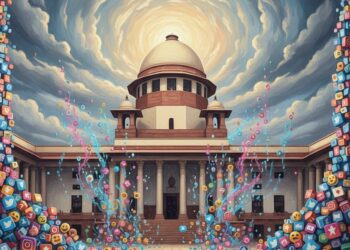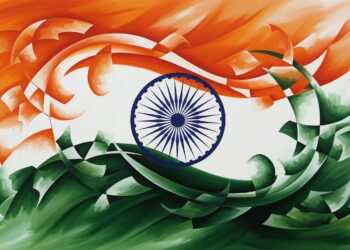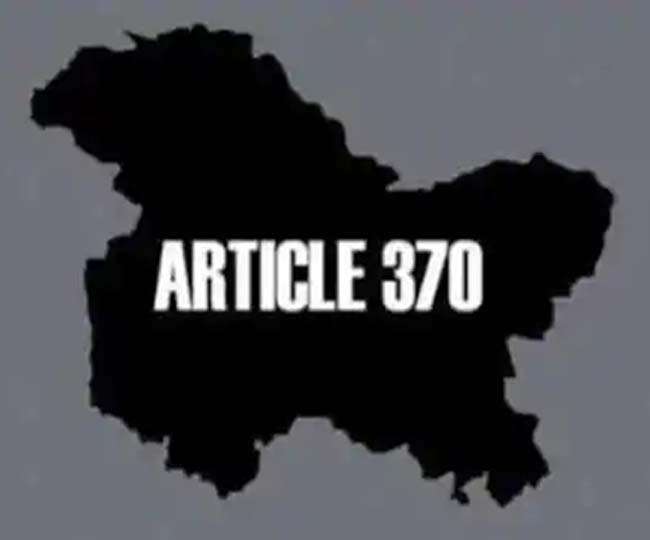There is a bad book around. And the state, in order to keep our pristine minds unsullied, has decided to slap a parental ban on the book. We, the impressionable toddlers subsisting under the prudent watch of the state, must look up at the state and lisp a gurgling ‘thank you’ beaming our toothless grins of innocent gratitude.
The ‘unholy’ book is about the very same Father-of-the-Nation Mahatma Gandhi who had unwavering belief in the power of truth and non-violence and also penned a surprisingly candid autobiography called The Story of my Experiments with Truth, which might be a little too truthful for many of the prudish, puritan Gandhians to stomach. The old man was equally welcoming of all versions of truth, and was averse to using any kind of force, let alone the uncouth tool of state-imposed bans, to muffle dissent or to cast away an uncomfortable or unpleasant disclosure of or take on the truth.
Quite obviously, the central question here is whether the extreme step of banning the book in this case justifiable. But before we get into the nitty-gritty of this particular silencing of authorial voice, let’s consider the gravity of bans on creative freedom in general so that we know what is at stake and how severe could be the consequences of ignoring the issue or settling it unwisely, narrowly or by misapplying the otherwise admirable virtue of ‘tolerance’ to bans. It is the scathing creative works that must be tolerated, if the need be, and not their banning.
All state actions that tend to restrict freedom of speech and expression must be backed by unimpeachable justification because encroaching upon the right to express is stepping upon the throat of democracy itself. And if the state, under a democratically elected government, seeks to trample upon one of the founding pillars of democracy itself, it must be considered guilty of resorting to dictatorial means for evil ends until proven otherwise.
As for the book by Pulitzer Prize-winning author Joseph Lelyveld on the Mahatma, Great Soul: Mahatma Gandhi and His Struggle With India, it found itself at the receiving end simply because it retold what was already well-documented and one of the reviewers in the far-off foreign land read it through his sexually coloured, microscopic glasses and found fine gay specks nestled within the nuclear structure of the book’s narrative.
And two of the states – Maharashtra andGujarat– moved promptly and slapped a ban on the book even before it entered Indian markets. The alacrity of the preemptive strike was reminiscent of the American ‘anti-terror’ onslaught undertaken in retaliation to the WTC attack.
 So, how did the government conclude that the book was offensive enough to deserve a ban without a first-hand analysis of the material said to be ‘offensive’? Could the review, being a personal take of a foreigner on the book, serve as the sole basis for the government make an ‘opinion’? Isn’t review much the same in status as hearsay? Could ‘hearsay’ be the basis for the restriction of a freedom as precious as that of ‘speech and expression’? A review is nothing but an opinion; and it is plainly disastrous to base one’s opinion solely on an opinion because it amounts to an ‘agreement’ without a first-hand analysis of the subject matter of agreement itself. Therefore, an opinion based on another opinion is not an ‘opinion’ at all. It is just a credulous – and often foolish – belief in the judgment of someone else. Quite obviously the government did not ‘form’ an opinion before banning the book, which implies that the ban was an arbitrary exercise of power with no application of mind.
So, how did the government conclude that the book was offensive enough to deserve a ban without a first-hand analysis of the material said to be ‘offensive’? Could the review, being a personal take of a foreigner on the book, serve as the sole basis for the government make an ‘opinion’? Isn’t review much the same in status as hearsay? Could ‘hearsay’ be the basis for the restriction of a freedom as precious as that of ‘speech and expression’? A review is nothing but an opinion; and it is plainly disastrous to base one’s opinion solely on an opinion because it amounts to an ‘agreement’ without a first-hand analysis of the subject matter of agreement itself. Therefore, an opinion based on another opinion is not an ‘opinion’ at all. It is just a credulous – and often foolish – belief in the judgment of someone else. Quite obviously the government did not ‘form’ an opinion before banning the book, which implies that the ban was an arbitrary exercise of power with no application of mind.
Furthermore, the tone of the review by Andrew Roberts in the Wall Street Journal that formed the basis for the ban is sharp and overly critical of Gandhi, which is clearly suggestive of the reviewer’s intense dislike for the Mahatma. Thus, the impartiality and fairness of the review is very much doubtful. Could such a review be justifiably relied upon for the purpose of a ban?
In this context, it is noteworthy that the author categorically rejected the interpretation of the reviewer. The author said, “It [the book] does not say Gandhi was bisexual. It does not say that he was homosexual. It does not say that he was a racist. The word bisexual never appears in the book and the word racist only appears once in a very limited context; relating to a single phrase and not to Gandhi’s attitude or history inSouth Africa. I didn’t say these things, So I can hardly defend them. It is a responsible book, it is a sensitive book, it is a book that is admiring of Gandhi and his struggle for social justice inIndiaand it’s been turned into some kind of a sensationalist pot boiler. It is not. They should at least make an effort to see the pages that they think offend them before they take such an extreme step.”
Has the state improperly and without due justification overstepped the boundary laid down by Article 19 (1) (a) with respect to the Right to Freedom of Speech and Expression in clamping the ban?
The state would, in all likelihood, defend itself by arguing that the freedoms under Article 19 are available to the citizens ofIndiaonly, and the author of the work in question, being a foreigner, cannot claim any right under Article 19. Even if it is conceded that the author does not have a right under Article 19, we, as the citizens of the country, certainly have the right to know the author’s opinion about the Father of the Nation even if the remarks are uncharitable, especially when the work is based on actual documents.
Furthermore, since the exercise of authority is without application of mind and without proper scrutiny of the offensiveness of the impugned material, nothing saves it from being ‘unreasonable and arbitrary’, which means it stands in clear violation of Article 14. And the protection of Article 14 extends to the citizens and the non-citizens alike.
 Not that there was some ambiguity about the law pertaining to bans on books. There have been considerable number of occasions on which the higher court including the Supreme Court have made it amply clear that the freedom of speech and expression cannot be lightly interfered with, it being the lifeblood of democracy, which, in turn, is part of the Basic Structure of the Constitution, the government doesn’t seem to be listening, or is, perhaps, trying to play ignorant so as to score the brownies with the gullible electorate before the position is reiterated and the ban judicially trashed.
Not that there was some ambiguity about the law pertaining to bans on books. There have been considerable number of occasions on which the higher court including the Supreme Court have made it amply clear that the freedom of speech and expression cannot be lightly interfered with, it being the lifeblood of democracy, which, in turn, is part of the Basic Structure of the Constitution, the government doesn’t seem to be listening, or is, perhaps, trying to play ignorant so as to score the brownies with the gullible electorate before the position is reiterated and the ban judicially trashed.
The State of Maharashtrabanned Shivaji Hindu King in Islamic India by Prof. James W. Laine in 2006 after a few violent incidences were reported, which were largely carried out by the ‘Sambhaji Brigade’. The government proceeded against the author and the publishers under Sections 153, 153A read with Section 34 of the Indian Penal Code, and ordered forfeiture of the copies of the book under Section 95(1) of the Code of Criminal Procedure, 1973. The Supreme Court found no merit in the ban and set it aside on the grounds that the government notification failed to show which of the two communities identifiable on the basis of language, caste, race or religion were likely to experience mutual antagonism on account of the book because the government failed to show which community did not revere Shivaji. Those who revere Shivaji and those who don’t could not be treated as two communities for the purpose of the provisions invoked. Furthermore, the intention to cause animosity (mens rea) between two groups could also not be established. The Supreme Court said:
…there is nothing on record on the basis whereof the Government could form the opinion that the book was likely to promote disharmony or feeling of enmity between various groups or likely to cause disturbance to public tranquility and maintenance of harmony between various groups.
The ruling quite clearly demands of the government to make a reasoned decision with due application of mind considering all facts and circumstances. Only such written content is capable of being banned that is either born out of vicious intent to cause disturbance in general or cause animosity between the two identifiable groups, or is a reckless and irresponsible exercise of the freedom of speech in complete disregard of all propriety. Anything short of it simply does not call for silencing by state fiat.
The Mahatma himself never made a secret of his life. It would, therefore, be against the central philosophy the great man lived by to muffle even those voices that speak of him in irreverent tone. If freedom to express does not include freedom to offend, it’s form without content.
Mahatma would continue to be what he is and has been for us, but we cannot demand that he must be held in the same high regard by all. To be intolerant of the uncomfortable truth is nothing but self-deception – a patent moral defect that the Mahatma would very certainly abhor.
Originally written for and published in LAWYERS UPDATE as Cover Story [May 2011 Issue; Vol. XVII, Part 5]






